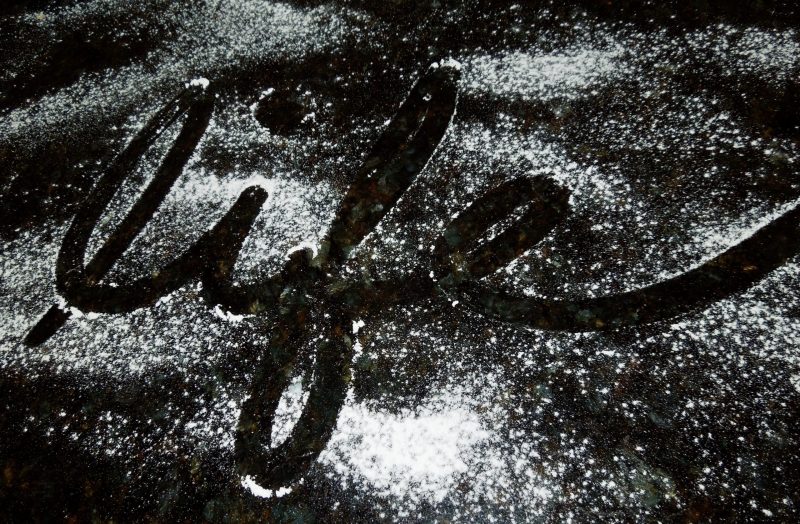We vacuum religiously at our house. Dusting is another story, but you wouldn’t know it from our shelf full of dusting supplies: fuzzy blue Norwex dusting mitts, a California Duster, cans of Endust and Pledge, a Swiffer duster, and a pile of rags big enough to suds the entire exterior of the house. But the truth is, we mostly dust when we’re having company, which isn’t often even when there isn’t a pandemic.
You can see the problem (if you brush off the dust).
Over the past year, we compensated for the lack of company by painting everything—bathrooms, bedrooms, living room, kitchen, entryway, and hallways. Since we didn’t want to mix “Dusty Gray” into “Morning Zen,” “Frittata,” and “Khaki Shade,” we cleaned off the dusting shelf and got to work. It was a whole year of spring cleaning.
But the paint has dried and the dust is settling, again.
Dusting feels like a waste of time. I suppose all cleaning can feel like this—how long is the laundry basket empty? The mirror unspotted? The stovetop sparkly? But dusting is different. The laundry basket gets full because you change clothes, the mirror gets spotty because you wash your hands, the stovetop gets gunky because you make dinner. Dust? It shows up before the rag even lands in the laundry basket. The only thing required for dust to reappear is the passage of time—and pitifully little of it.
This all feels appropriate given some of the weighty symbolism associated with dust in the Bible: “Dust you are and to dust you will return” (Gen 3:19). Dust is a picture of our mortality, a reminder that we are frail and dying. Even if we’re in perfectly good health, the dust is collecting with every jerk of the second hand.
It’s no wonder that dust is also part of mourning rituals in the Bible. In seasons of grief, people wore sackcloth (think burlap) and sprinkled ashes—dust—on themselves. Sometimes they sat in the dust. Sometimes they tore their clothes, sprinkled ashes on their heads, and wailed—for themselves or for a suffering friend. This is what Job’s friends did—when they were being friends. They heard that he had lost everything, and they went to comfort him. When they saw him, flesh festering while he sat in a heap of ashes, they tore their clothes, sprinkled ashes on their heads, and wailed for his profound loss. Then they all sat down in dusty silence for seven days and nights.
I don’t own any sackcloth, and my dust is on the furniture. But like you, I have grieved and shared grief in defined ways. I have sent sympathy cards and flowers. I have given to a memorial fund. I have worn black. I have gathered with friends to share hugs, tears, and memories. I have stood in silence at a gravesite. I have shared in a meal lovingly prepared in a church kitchen.
But not in the past year. Not since COVID slammed the door on anything social besides distancing.
My dad died last April, about the time we were still learning to mute ourselves on Zoom. He quietly slipped away after weeks in hospice care, and he was quietly remembered by nine family members in a dimly lit sanctuary that could have—would have—held a couple hundred people. At the same time, my mom was embarking on a full year of isolation in assisted-living lockdown. Profound losses, all these things.
Not all of us have lost someone in the past year, but we all have lost. Job. Income. Office camaraderie. A comfortable routine. A sense of safety. Convenience. The freshman experience. A senior year. Extended family gatherings. Many of our losses are the same—“we’re all in this together,” after all—but many are not. They are as unique as we are.
What is the same for all of us is that a year’s worth of dust has collected. Time has passed, the loss of another year and the greater loss that we did not—could not—share all its good and its grief with those in our various communities.
In recent months, much of the world has picked up their dust rags again, cleaning up spaces shrouded by COVID and welcoming people back. Our little church is doing the same this weekend, reopening after more than a year of “couch church.” I am excited to see the dear flesh-and-blood faces that have been hidden behind names in a livestream feed for so many months.
But I’m also apprehensive, reluctant even. Mingling in the best of times is not my strongest skill, and these are not the best of times. I have spent much of the past year on a heap of ashes in my own house, tearing my clothes and wailing loudly with only Rick to join me. He is the best of company in grief, but the weight of grief needs a community to bear it—the very thing COVID took.
We all have our ash heaps, some bigger than others. And while they aren’t good places for mingling, they are good places for company. Let’s just sit for a while. We can sweep the dust away later.



Recent Comments